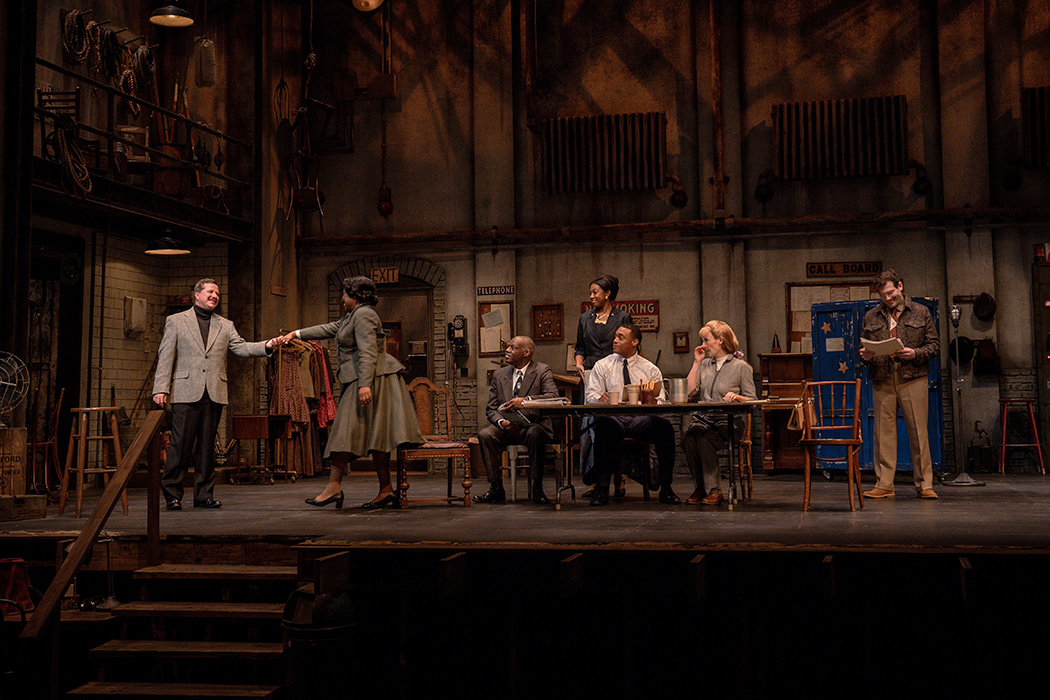Had things gone differently for playwright Alice Childress in 1957, her play Trouble in Mind would have had the honor of being the first play written by a Black woman on Broadway. Of course, things didn’t go as planned—in 1959, Lorraine Hansberry’s A Raisin in the Sun received that distinction. As Trouble In Mind prepared to move to Broadway from a successful Greenwich Village off-Broadway production, demands from producers to tone down her play’s message were unacceptable to Childress; the Broadway production was subsequently canceled. The painful irony for Childress was that her real life issue mirrored that of her play’s main character, the black actress Wiletta Mayer, who is forced to choose between a role in the theatre and the perpetuating of racial stereotypes.
Childress died in 1994, never seeing the eventual first Broadway run of Trouble in Mind in 2021. However, a powerfully insightful, skillfully assembled, and brilliantly acted production of it, directed by Marti Gobel, opened at the Clarence Brown Theatre last week. The 66 years since Childress’ lost opportunity underscores what the tragedy of lost opportunity is all about.
The very idea of actors portraying actors, and a play about a play being rehearsed, was fertile ground for scenic designer Christopher Pickart who provided a deliciously realistic Broadway theatre stage space that truly feels like an extension of the 1950s. At the same time, it also symbolizes a theatre world that has acknowledged the inequities and the need for change, but often failed to act on it in meaningful ways.

As the cast for the play within the play—a supposed “anti-lynching melodrama” titled “Chaos in Belleville”—arrives for the first day of rehearsals, we see a range of resistance and acceptance in the actors through the comic small-talk and chatter that Childress skillfully uses as exposition. First to arrive is the lead actress, Wiletta Mayer (Shinnerrie Jackson), clearly in love with the abstract idea of theatre, who finds herself chatting with the doddering old theatre doorman (Tom Parkhill) about the “good-old days.” However, the old days for Wiletta, we learn, were regularly limited to stereotyped roles with “jewel” and “flower” named-characters—Magnolia, Gardenia, Opal, etc. —that regularly involved portraying a domestic servant carrying a tray or answering a doorbell.
Cast members Sheldon Forrester (Rico Bruce Wade) and Millie Davis (McKinley Merritt) have learned to play the game without “open” complaint in return for getting an acting job, a game in which Black actors learn to avoid controversy and laugh at the jokes of directors and producers. When Forrester is given the stage business of whittling on a stick, he does it without question. In contrast, the young actor John Nevins (Will Dorset IV) is in his first Broadway play and thus is full of ideas of how the world should work. He hasn’t yet suffered the disillusionment of Sheldon and Millie, nor felt the need to go along.
Also a contrast is the situation of the two White actors in “Chaos in Belleville”: a clueless Yale School of Drama grad, Judy Sears (Rachel Darden) and the equally clueless veteran actor Bill O’Wray (Terry Weber). O’Wray doesn’t like the attention he gets when socializing over lunch with the cast; Sears laments the possibility that she might have to move back to her parent’s house in Bridgeport, CT, should the play close. It never seems to dawn on them that the other cast members would suffer far worse when unemployed.
Childress has constructed a brilliant darkly comic parody of an egotistical, nightmare director in the character of Al Manners (Joshua Peterson). Ticking off many boxes of unpleasant and unacceptable director traits, Manners takes particular joy in harassing those who are defenseless and under his power, like the put-upon stage manager Eddie Fenton (Michael Najman) who cowers and accepts the abuse. However, as Wiletta begins to question her participation in the script’s stereotyped dialog and style, and barely disguised rhetorical racism, Manners turns up the heat on her, revealing his true character writ large. When she objects to Manner’s defense of the indefensible gist of the play, that painting of a spineless tyrant is complete.

In a word, this CBT cast for Trouble in Mind is terrific from top to bottom. Gobel has instilled an energetic, up-tempo pace in the dialog delivery that drives the characters from reveal to revelation. As Wiletta, Shinnerrie Jackson offers a stunningly dramatic character evolution of three layers: acceptance of one’s situation, recognition that acceptance is wrong, and, finally, understanding that winning a philosophical battle comes with other consequences of existence.
Rico Bruce Wade offers up a marvelous paradox in the character of Sheldon Forrester. In one moment he gleefully does an actor’s job, blindly following directions and reciting dialog that is almost pure stereotype. In the next, he reveals to the cast and director that he is perhaps the only one present that has actually witnessed a lynching, a moment of description that was as sublimely delivered, and dramatically effective, as it was horrific.
Creating a truly unlikable character is not easy, so specific kudos go to Joshua Peterson for his driven, almost breathless take on Al Manners. Whether a chortle at directors in general, or a sneer at directors with hidden agendas, one really wants to laugh at his parody of Manners, but the character’s failings as a human being are more inclined to elicit a symbolic boo.
In addition to scenic designer Pickart, Gobel’s creative team included costume designer Devario D. Simmons who nailed the 1950s look, lighting designer Joshua J. Mullady, and sound designer and composer Joe Cerqua for music and some background sound effects of theatre ambience.
Admittedly, we don’t live in the 1950s, thank god. But, a lesson to be learned here from Broadway, Alice Childress, and Trouble in Mind is that lost human opportunities must be acknowledged and left in the past if they are to be avoided in the future.






